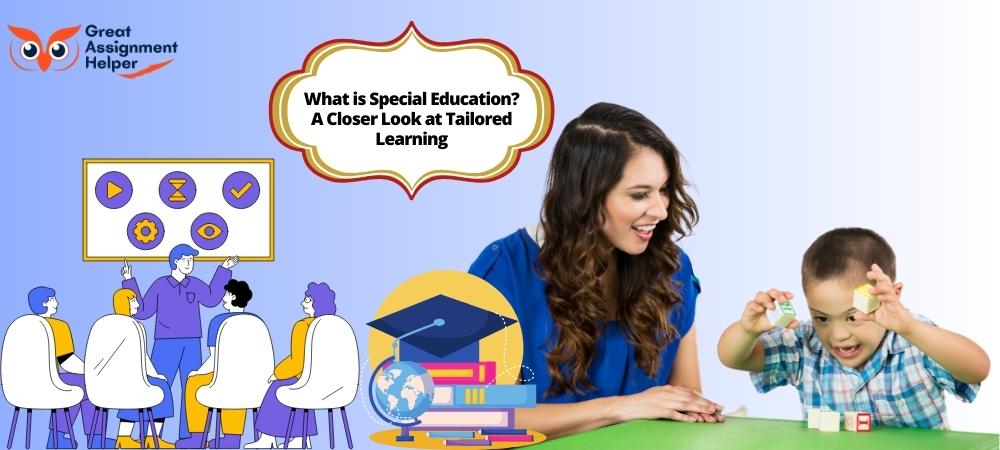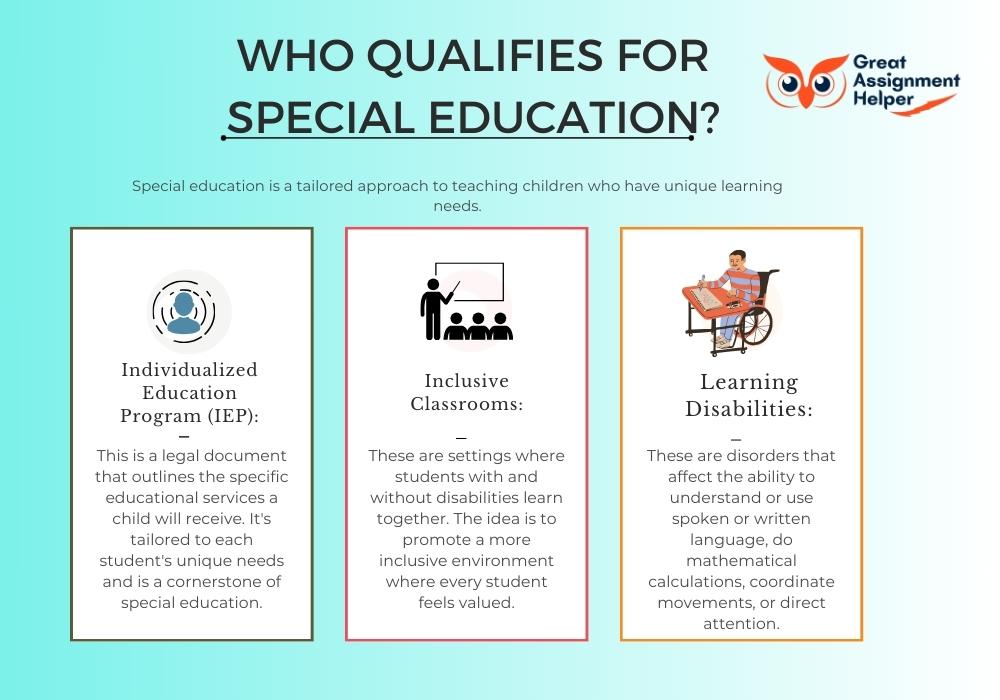
Listen To This Blog
Introduction
Special education is a realm that goes beyond the conventional classroom setting. It's a unique and tailored approach designed to cater to students who have individual learning needs. At its core, special education is about ensuring that every child, regardless of their physical disabilities or learning disabilities, receives the educational support they need. This encompasses a wide range of services, from early intervention for young children showing signs of developmental delays to specialized curriculum tailored to each student's needs.
Special education teachers play a pivotal role in this process, equipped with the skills to offer differentiated instruction that aligns with each child's unique capabilities and challenges. They are well-versed in special education laws, ensuring that every child's right to education is upheld. In today's inclusive classrooms, you'll find a blend of traditional teaching and adaptive teaching methods, ensuring that every student, whether they require speech therapy in schools or assistive technology in education, gets the best possible learning experience.
Furthermore, understanding the intricacies of behavioral disorders in children and the importance of the Individualized Education Program (IEP) is crucial in this field. So, if you've ever wondered, "What is special education?" or wanted to delve deeper into special education terms and basics, you're in the right place. This guide will offer insights about special education, shedding light on its significance and the myriad ways it transforms the educational landscape.
Who Qualifies for Special Education?

Special education is a tailored approach to teaching children who have unique learning needs. But who exactly qualifies for this specialized instruction? Let's delve into the basics of special education to understand the criteria.
At its core, special education is designed for students who have specific disabilities that impact their ability to learn in a traditional classroom setting. These disabilities can range from learning and intellectual disabilities to emotional disturbances, physical disabilities, and even speech or language impairments.
To determine if a child qualifies for special education, a series of assessments and evaluations are conducted. These are not just based on academic performance but also consider the child's overall well-being and how their disability might be affecting their day-to-day life.
Now, when we talk about special education terms, it's essential to understand some key concepts:
- Individualized Education Program (IEP): This is a legal document that outlines the specific educational services a child will receive. It's tailored to each student's unique needs and is a cornerstone of special education.
- Inclusive Classrooms: These are settings where students with and without disabilities learn together. The idea is to promote a more inclusive environment where every student feels valued.
- Learning Disabilities: These are disorders that affect the ability to understand or use spoken or written language, do mathematical calculations, coordinate movements, or direct attention.
Understanding the basics of special education is crucial for parents, educators, and even students. It's not just about providing extra help; it's about ensuring that every child has an equal opportunity to succeed, regardless of their challenges.
In conclusion, special education is a vast field with many nuances. If you're curious about special education or wonder if someone you know might benefit from it, it's essential to familiarize yourself with the criteria and consult with educational professionals.
How Do Kids Qualify for Special Education?
Special education is a tailored approach to teaching children who have unique learning needs. It's not just about the curriculum; it's about providing the right environment, tools, and methods to ensure every child can thrive. But how exactly do kids qualify for this specialized form of education? Let's delve into the special education basics to understand the qualification process.
To begin with, it's essential to understand what special education is. Special education is designed to meet the specific needs of children with disabilities. It encompasses a range of services, from modified instruction in the regular classroom to specialized programs in separate settings.
The process of determining if a child qualifies for special education typically involves several steps:
- Referral: Often, a teacher, parent, or doctor might notice signs that a child is struggling in the regular classroom setting. They can then refer the child for an evaluation to determine if there are any learning or developmental disabilities.
- Evaluation: This is a comprehensive assessment that looks into various aspects of the child's abilities. It might include psychological testing, speech and language evaluations, and physical examinations, among others.
- Meeting of the IEP Team: Once the evaluations are complete, an Individualized Education Program (IEP) team meets. This team usually consists of parents, teachers, school psychologists, and other relevant professionals. They review the evaluation results and determine if the child meets the special education terms and criteria set by the state or district.
- Development of the IEP: If the child qualifies, the IEP team develops a plan tailored to the child's needs. This plan outlines the services the child will receive, the goals set for them, and how progress will be measured.
- Implementation: With the IEP in place, the child then receives the services outlined in the plan. This could be anything from additional tutoring to speech therapy or even placement in a specialized classroom.
- Regular Review: The child's progress is regularly reviewed, and the IEP is adjusted as needed.
For parents and guardians curious about special education, it's crucial to be proactive. If you believe your child might benefit from special education services, reach out to your school or district. They can provide more information and guide you through the evaluation process.
In conclusion, special education is a vital resource for many children. It offers them the support and tools they need to succeed academically. By understanding the qualification process and being proactive, parents can ensure their children receive the best possible education tailored to their unique needs.
Special Education Terms You May Hear
Special education is a vast field, encompassing a range of services, methodologies, and terminologies tailored to meet the unique needs of students. If you're delving into the world of special education, whether as a parent, educator, or curious individual, it's essential to familiarize yourself with some of the foundational terms and concepts. Here's a primer on special education basics and some terms you might encounter.
1. What is Special Education? Special education refers to the customized instructional strategies, services, and tools provided to students who have disabilities, ensuring they receive an appropriate and meaningful education. It's not just about teaching methods but also about creating an environment where students with special needs can thrive alongside their peers.
2. Individualized Education Program (IEP) One of the most frequently mentioned terms in special education is the Individualized Education Program or IEP. It's a legally binding document that outlines the specific educational services, goals, and accommodations a student with a disability will receive.
3. Inclusive Classrooms Inclusion means that students with disabilities learn alongside their non-disabled peers in general education classrooms. The idea is to foster a sense of belonging and ensure every student has access to the general curriculum.
4. Learning Disabilities This term refers to a group of disorders that affect a person's ability to process information. Examples include dyslexia (difficulty with reading), dyscalculia (challenges with math), and dysgraphia (problems with writing).
5. Early Intervention Early intervention services are designed for younger children (typically up to age 3) who show signs of developmental delays. The sooner these services are provided, the better the outcomes for the child.
6. Differentiated Instruction This is a teaching method where educators adapt their teaching styles and materials to cater to the diverse needs of all students in the classroom, not just those with special needs.
7. Assistive Technology These are tools and devices designed to help students with disabilities in their learning process. Examples include speech-to-text software, braille readers, and specialized keyboards.
8. Behavioral Disorders Some students in special education have behavioral disorders, which means they might exhibit disruptive behaviors. Terms like ADHD (Attention Deficit Hyperactivity Disorder) or ODD (Oppositional Defiant Disorder) fall under this category.
In conclusion, understanding the basics of special education and its associated terms is crucial for anyone involved or interested in the field. It ensures that students receive the support they need and that educators and parents can communicate effectively about a child's educational journey.
Wrapping Up:
Special education is a crucial and intricate field dedicated to ensuring that all students, regardless of their individual learning needs, receive the appropriate support and resources to thrive academically. Throughout this article, we've delved deep into what special education means, explored essential special education terms, and provided insights about its foundational principles. Whether you're a parent seeking to understand the nuances of the Individualized Education Program (IEP) or a student researching the basics of inclusive classrooms, it's evident that special education plays a pivotal role in shaping the educational landscape. For those who might need further clarification or assignment help related to special education basics, there are numerous resources and experts available to guide you. Remember, every child has the right to quality education, and understanding the intricacies of special education is a step towards ensuring that right for all.

